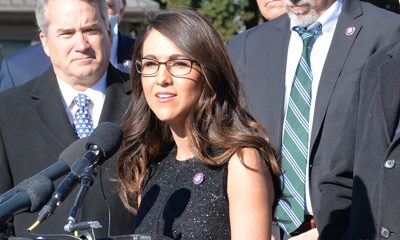Arts & Entertainment
Bill Maher under fire for homophobic humor, again
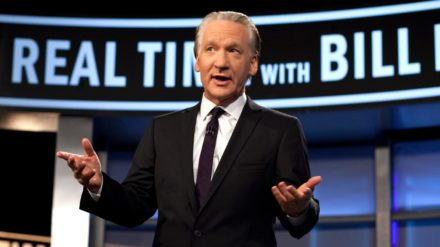
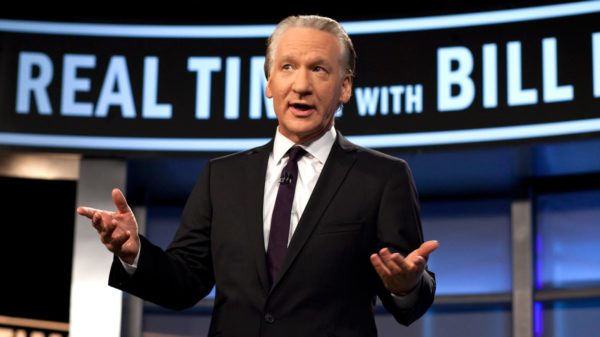
Comedian and talk show host Bill Maher (Photo credit: Janet Van Ham/HBO)
Talk show host Bill Maher is once again facing criticism for using homophobic humor, this time for a feature he did on the most recent episode of his HBO TV show, “Real Time with Bill Maher.”
In the segment, which was making fun of Senator Lindsey Graham, the comedian included several jokes based on outdated gay stereotypes.
Though the focus of Maher’s rant was what he called Senator Graham’s “hypocrisy on steroids,” he read selections from a list titled “24 Things You Don’t Know About Lindsey Graham.” which included several one-liners referencing once-familiar clichés about gay people.
The full list:
- My name is Lindsey and my pronouns are He and Y’all.
- My spirit animal is a jellyfish.
- I burn calories by skipping to work.
- I’m the only Senator whose office has a bidet and a fainting couch.
- For three weeks in 1992 I was married to Liza Minnelli.
- In a fire, the first things I’d save are my bridal magazines.
- When I was in school, the kids would tease me by calling me “Lindsey.”
- I was the first person to push a dog around in a stroller.
- The greatest advice my mother gave me was to stop waving my hands when I run.
- My quote in the high school yearbook was “a lady is allowed to changed her mind.”
- My greatest legislative accomplishment is naming a post office after Nathan Lane.
- If Trump and I were a celebrity couple, I’d want the tabloids to call us “Donsey.”
- I once kissed Trump’s ass so hard I could taste Hannity.
- John McCain’s last words to me were “Let go of my hand.”
- People who say I’m anti-immigrant haven’t heard me talk about Siegfried and Roy.
- When people call me a “hawk” I just want to bomb the sh*t out of them.
- My favorite James Bond movie is Octo-yucky.
- I’m one of only three people in Washington allowed to trim President Trump’s nose hairs.
- I employ over a dozen pool boys even though I don’t own a pool.
- Irony alert! Thanks to a food allergy, I avoid fruit.
- For Halloween, I went as the Lindsey Graham from the Clinton impeachment.
- If you saw just five seconds of the videotape Trump has of me, everything would suddenly make sense.
- My nickname in the Air Force was “JAG-off.”
- If it was socially acceptable, I would wear nothing but scarves.
Graham has long been the butt of jokes around rumors of his homosexuality (rumors that he consistently denies), but some of Maher’s comedic digs within the list are based on negative tropes which are now largely considered demeaning and harmful.
Maher has been accused before of perpetuating homophobic stereotypes in his political comedy, such as when he joked earlier this year about the Trump-Putin relationship by saying, “Forget collusion, I want to know if there’s penetration.”
He’s not the only one, either. Comedian Chelsea Handler fell under fire over her homophobic jokes about Graham being gay, being a bottom, and having a “d*ck-sucking video.”
More recently, Broadway icon Patti LuPone was criticized for joking on Twitter that Graham was a “disgrace” who should “just bite the bullet and come out.”
Movies
Sexy small town secrets surface in twisty French ‘Misericordia’
A deliciously depraved story with finely orchestrated tension
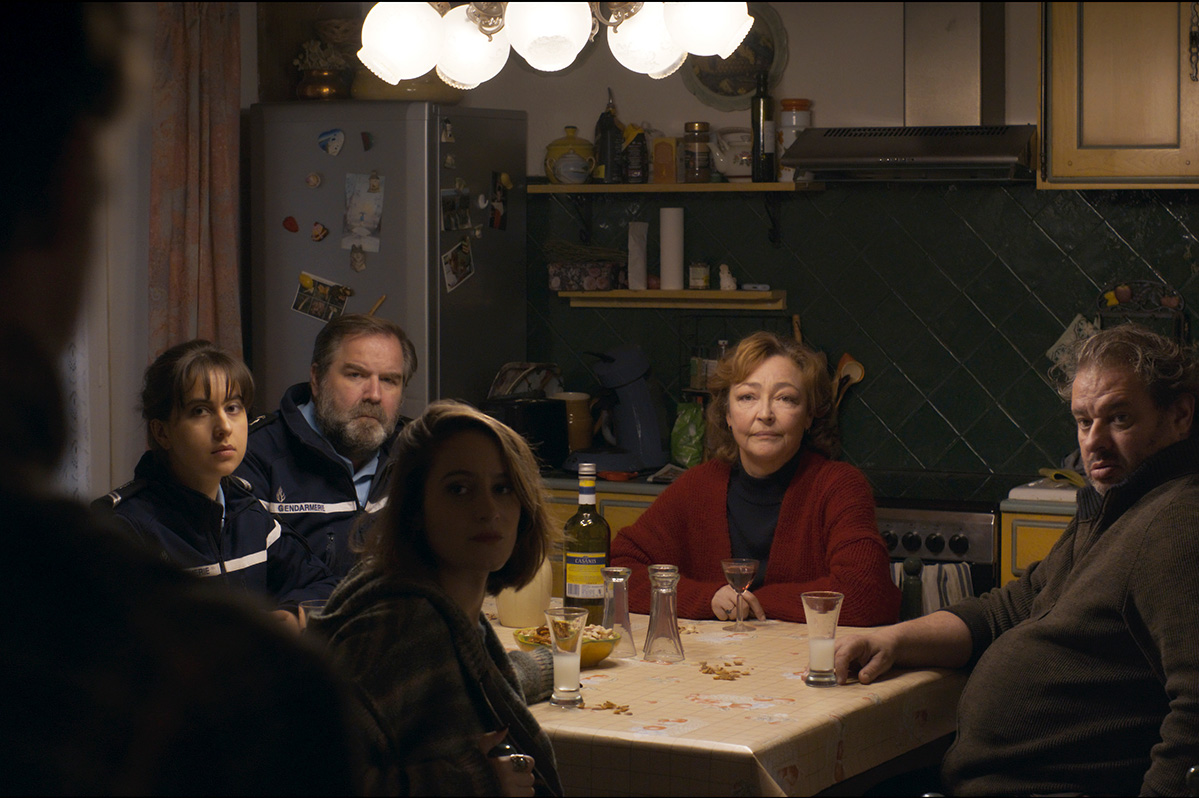
The name Alain Guiraudie might not be familiar to most Americans, but if you mention “Stranger by the Lake,” fans of great cinema (and especially great queer cinema) are sure to recognize it immediately as the title of the French filmmaker’s most successful work to date.
The 2013 thriller, which earned a place in that year’s “Un Certain Regard” section of the Cannes Film Festival and went on to become an international success, mesmerized audiences with its tense and erotically charged tale of dangerous attraction between two cruisers at a gay beach, one of whom may or may not be a murderer. Taut, mysterious, and transgressively explicit, its Hitchcockian blend of suspense, romance, and provocative psychological exploration made for a dark but irresistibly sexy thrill ride that was a hit with both critics and audiences alike.
In the decade since, he’s continued to create masterful films in Europe, becoming a favorite not only at Cannes but other prestigious international festivals. His movies, each in their own way, have continued to elaborate on similar themes about the intertwined impulses of desire, fear, and violence, and his most recent work – “Misericordia,” which began a national rollout in U.S. theaters last weekend – is no exception; in fact, it draws all the familiar threads together to create something that feels like an answer to the questions he’s been raising throughout his career. To reach it, however, he concocts a story of small town secrets and hidden connections so twisted that it leaves a whole array of other questions in its wake.
It centers on Jérémie (Félix Kysyl), an unemployed baker who returns to the woodsy rustic village where he spent his youth for the funeral of his former boss and mentor. Welcomed into the dead man’s home by his widow, Martine (Catherine Frot), the visitor decides to extend his stay as he revisits his old home town and his memories. His lingering presence, however, triggers jealousy and suspicion from her son – and his own former school chum – Vincent (Jean-Baptiste Durand), who fears he has ulterior motives, while his sudden interest in another old acquaintance, Walter (David Ayala), only seems to make matters worse. It doesn’t take long before circumstances erupt into a violent confrontation, enmeshing Jérémie in a convoluted web of danger and deception that somehow seems rooted in the unspoken feelings and hidden relationships of his past.
The hard thing in writing about a movie like “Misericordia” is that there’s really not much one can reveal without spoiling some of its mysteries. To discuss its plot in detail, or even address some of the deeper issues that drive it, is nearly impossible without giving away too much. That’s because it’s a movie that, like “Stranger by the Lake” and much of Guiraudie’s other work, hinges as much on what we don’t know as what we do. Indeed, in its earlier scenes, we are unsure even of the relationships between its characters. We have a sense that Jérémie is perhaps a returning prodigal son, that Vincent might be his brother, or a former lover, or both, and that’s just stating the most obvious ambiguities. Some of these cloudy details are made clear, while others are not, though several implied probabilities emerge with a little skill at reading between the lines; it hardly matters, really, because as the story proceeds, new shocks and surprises come our way which create new mysteries to replace the others – and it’s all on shaky ground to begin with, because despite his status as the film’s de facto protagonist, we are never really sure what Jérémie’s real intentions are, let alone whether they are good or bad.
That’s not sloppy writing, though – it’s carefully crafted design. By keeping so much of the movie’s “backstory” shrouded in loaded silence, Guiraudie – who also wrote the screenplay – reminds us that we can never truly know what is in someone else’s head (or our own, for that matter), underscoring the inevitable risk that comes with any relationship – especially when our passions overcome our better judgment. It’s the same grim theme that was at the dark heart of “Stranger,” given less macabre treatment, perhaps, but nevertheless there to make us ponder just how far we are willing to place ourselves in danger for the sake of getting what – or who – we desire.
As for who desires what in “Misericordia,” that’s often as much of a mystery as everything else in this seemingly sleepy little village. Throughout the film, the sparks that fly between its people often carry mixed signals. Sex and hostility seem locked in an uncertain dance, and it’s as hard for the audience to know which will take the lead as it is for the characters – and if the conflicting tone of the subtext isn’t enough to make one wonder just how sexually adventurous (and fluid) these randy villagers really are beneath their polite and provincial exteriors, the unexpected liaisons that occur along the way should leave no doubt.
Yet for all its murky morality and guilty secrets, and despite its ominous motif of evil lurking behind a wholesome small-town surface, Guiraudie’s pastoral film noir goes beyond all that to find a surprisingly humane layer rising above it all, for which the town’s seemingly omnipresent priest (Jacques Develay) emerges to assert in the film’s third act – though to reveal more about that (or about him) would be one of those spoilers we like to avoid.
There’s a clue to be found, however, in the film’s very title, which in Catholic tradition refers to the merciful compassion of God for the suffering of humanity, but can be literally translated simply as “mercy.” Though it spends much of its time illuminating the sordid details of private human behavior, and though the journey it takes is often quite harrowing, “Misericordia” has an open heart for all of its broken, stunted, and even toxic characters; Guiraudie treats them not as heroes or villains, but as flawed, confused, and entirely relatable human beings. In the end, we may not know all of their dirty secrets, we feel like we know them – and in knowing them can find a share of that all-forgiving mercy for even the worst of them.
It’s worth mentioning that it’s also a movie with a lot of humor, brimming with comically absurd character moments that somehow remind us of our own foibles even as we laugh at theirs. The cast, led by the opaquely sincere Kysyl and the delicately provocative Frot, forge a perfect ensemble to create the playful-yet-gripping tone of ambiguity – moral, sexual, and otherwise – that’s essential in making Guiraudie’s sly and ultimately wise observations about humanity come across.
And come across they do – but what makes “Misericordia” truly resonate is that they never overshadow its deliciously depraved story, nor dilute the finely orchestrated tension his film maintains to keep your heart pounding as you take it all in.
To tell the truth, we already want to watch it again.
Arts & Entertainment
Trans Day of Visibility: Let us put you on 5 Latinx musicians you should be listening to right now
Celebrate TDOV by listening to these genre and gender-bending musicians!
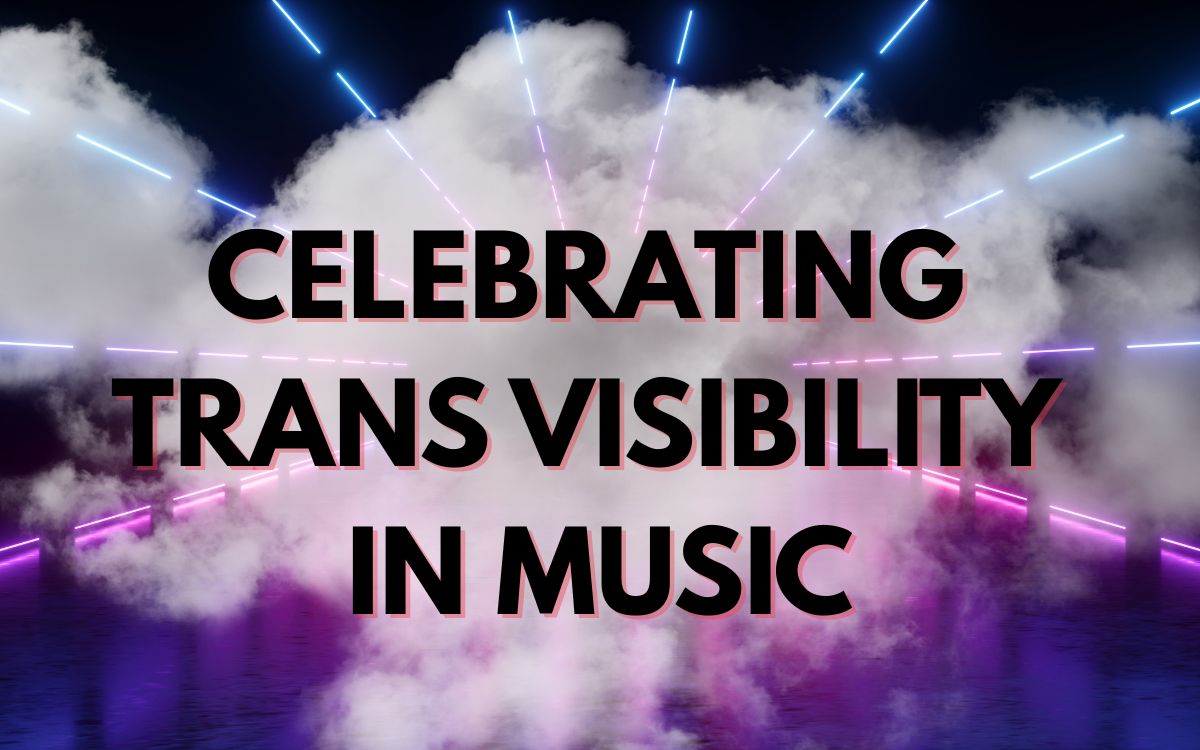
Finding the representation in music we need and sometimes don’t even know we need in the LGBTQ+ community, can be a challenge. The music industry is filled with industry plants and artists who rank high on lists, but low on talent. The industry continues to work in favor of men and just as queer icon, Doechii said in her acceptance Billboard’s Woman of the Year speech this past weekend, “lack of inclusion and sexism are still issues in this industry, and that’s a problem.”
It’s true – sexism is still a huge issue in the industry and the recent Executive Orders signed by the current administration are sure to erase any progress that has been made.
This is our moment to rise up and not let the light in us be lost in the darkness shading over our community, our rights, or the progress our trans-cestors have made.
Light can be seen, but perreo can be felt. After hearing the latest onslaught of terrible news, I like to turn to my c*nty, queer, playlists and listen to the under-appreciated icons that are constantly shadow banned for their woke content and their lit music.
Not all of these musicians idenfity as trans, but they make music for the trans, gender-defying, gender non-conforming and intersex baddies who just want to cry to some música regional mexicana sang from a wlw perspective, or dance all night in 9-inch heels – and everyone in between.
Villano Antillano
Antillano is a perreo force to be reckoned with in the reggaeton world. Maybe you’ve heard Antillano featured on one of your current saved fav’s, as they have collaborated with many mainstream artists. Antillano has music collabs with Young Miko, Bizarrap, RaiNao and Ptazeta. Her latest single released on Valentine’s Day is “XXL.”
On her Spotify, her bio reads: “you know who tf it is! the girl that’s not cis! mujer transsexual puertorriqueña; avid lyricist, prolific rebulera. ur favorite rappers favorite rapper.”
Alexis Mvgler
Mvgler is the cvnty tío we all need in our lives to introduce us to the world of drag. Mvgler is a drag performer who was on the sixth season of La Más Draga, the Mexican version of RuPaul’s Drag Race. Since her time on the show Mvgler has racked up nearly 150,000 listeners on Spotify and her latest single was released earlier this month.
Yahritza Y Su Esencia
Yahritza gives the queer community something we’ve searched under every rock to find – valid Woman Loving Woman representation in música regional mexicana. Yahritza is the singer of this band that gets a lot of hate for being fronted by a young kid who is visually gender nonconforming and sings from the male perspective toward women.
Love them or hate them, they’re out here doing something new and unique. The band is known for their unique sierreño urbano, a genre which is a mix between música regional mexicana and the urbano genre. Their song “Fragíl,” topped the charts in the U.S. and Mexíco. Disclaimer – the song was made in collaboration with Grupo Frontera, who since then have been cancelled by many in the Latinx community due to their support for Trump.
Though Yahritza does not identify as trans, her gender nonconforming look, boundary-breaking attitude and amazing voice, are more than enough to get recognition on this list and in the industry dominated by cisgender, heterosexual, men. Deal with it.
Brandon White
White only has 11,000 subscribers on Youtube and we’re here to change that. They are an under-appreciated musician born in Guadalajara, Jalísco and they make music for the children of the families that raised us on deeply-rooted misogyny. For those of us trying to outgrow all of that – listen to this Mexican baddie.
Paris Bang Bang
If you haven’t heard of Paris Bang Bang, we’re here to save you from yourself and the same ten songs you play on repeat when you’re trying to hype yourself up. Sit down, class is in session. Throw on their song, “MAESTRA” to learn how to be as genre and gender-bending as her and Amelia Waldorf in this song.
Arts & Entertainment
2025 Best of LGBTQ LA Readers’ Choice Award Nominations
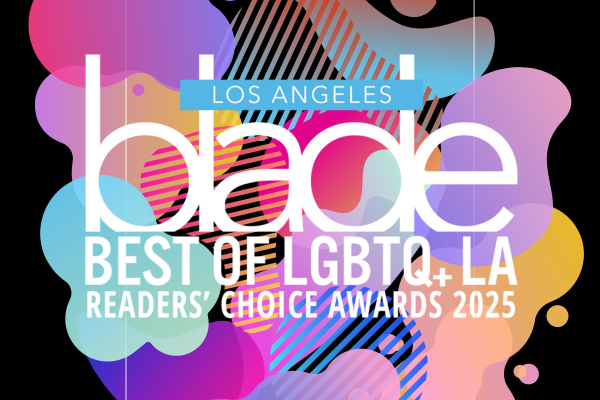
It’s time to celebrate the vibrant and diverse LGBTQ+ community of Los Angeles! Nominations for the Best of LGBTQ LA Awards are open from March 31st to April 6th, giving you the chance to highlight your favorite local legends, hotspots, performers, and change-makers. Then, from April 14th to April 27th, cast your vote for the finalists and help decide who truly represents the best of LGBTQ LA.
Use the form below or click the link HERE to nominate!

There’s long been a desire for a gay version of “The Golden Girls.”
GenX (and younger) fans who have loved that show’s iconic quartet of aging female “frenemies” have been clamoring for it since the actual “Golden Girls” was still on the air – so by the time the creators of “Mid-Century Modern” came up with the idea for a show about three gay friends “of a certain age” (and one cantankerous mother) living together in Palm Springs, it was hardly an original idea. Yet even if they weren’t the first to fantasize about a show featuring the gay male equivalents of Dorothy, Blanche, Rose, and Sophia, it hardly matters. They were the ones that actually made it happen.
That’s due in large part to who they are – or at least, what they’ve done before. The two men who hatched the plot (Max Mutchnick and David Kohan) were also responsible for “Will & Grace.” After they teamed up for a brainstorming session with queer TV powerhouse Ryan Murphy – who eagerly joined forces with them as the show’s executive producer – there was enough viability behind it to bring the long-gestated dream to fruition at last.
The “at last” came this week, when all 10 episodes of the show’s debut season dropped on Hulu, and it’s undeniable that there was not only a dream behind it, but also a considerable amount of talent – most obviously in its casting. Headlining (as “lingerie mogul” Bunny Schneiderman) is longtime stage/screen/TV star Nathan Lane, a multi-award winner who is a legend for his “Bird Cage” performance alone, with eternally hunky Matt Bomer adding a whole different flavor of star power as ditsy-but-sweet-hearted (and blithely promiscuous) flight attendant Jerry. The trio of friends is rounded out by former fashion columnist Arthur, played with imperious aplomb by Nathan Lee Graham, a lesser-known but equally well-rounded veteran performer whose resume includes roles in “Zoolander” and “Priscilla, Queen of the Desert,” as well as a guest appearance on “Absolutely Fabulous.” Finally, sitcom royalty (and Tony-winner) Linda Lavin – who passed away in December, after filming had completed on the show’s inaugural season – is on hand to steal scenes as Sybil, Bunny’s pull-no-punches mother, who owns the house they all live in and makes sure to assert her matriarchal dominance at every opportunity.
In the pilot episode, titled “Bye, George,” Bunny, Jerry, and Arthur reunite to mourn the death of an old companion, with whom the trio of friends once formed a quartet. With each of them facing the uncertainty of a new life after changes in the old one have left them to cope on their own, Bunny decides to invite his two remaining buddies to move with him to Palm Springs, to live with his mother Sybil in a spectacular mid-century modern (hence the name) house that would probably make Frank Sinatra jealous. The arrangement, however, becomes precarious even before it officially begins, when Bunny connects with a much-younger hook-up and becomes smitten – forcing his two would-be roommates into a scheme to bring him back to his senses before he rescinds their invitation and offers it to his new “boyfriend” instead. It’s classic sitcom material, of course, with lots of crossed wires and jumped conclusions to fuel the wackiness – though in this case, at least, the show stops short of the zany hijinks one might expect from Lucy and Ethel (or even Rose or Blanche) before wrapping things up with a friendship-affirming bow. We can’t fault it for that; there’s a premise to be launched here, after all.
Besides, there’s plenty of other comfortable old-school sitcom fun to be had throughout: a sparring match between Arthur and Sybil, whose love-hate dynamic quickly sets the stage for an ongoing battle of sharp wits and sharper tongues; the air-headed naivete of Jerry, with Bomer both leaning into and undercutting the cliché of the pretty-but-dumb aging “twunk”; and Bunny’s sincere but impulsive starry-eyed sentimentality, which is frequently undercut by his “Dorothy-esque” natural instinct (and Lane’s natural talent) for bitchy queendom.
Yet while there are clear choices to mirror the iconic personality traits of the original “Golden Girls” crew in “Mid-Century Modern,” the new series seems less regimented in defining each of its characters quite so succinctly, opting instead for a sort of “blend” in which the familiar personas of the former show’s leading ladies are spread a little more evenly between the four of them together. The result is a show that is obviously a new variation on an established theme, but one in which echoes of the original can be detected in each of its disparate elements rather than confined within the plainly-delineated parameters from which they have been inherited. To put it more plainly, it’s a show that acknowledges and embraces the material which inspired it, but goes beyond mere imitation to carve a space of its own. Neither a remake nor a reboot, it’s more like an offspring, a separate entity unto itself despite the DNA it shares with its progenitor.
Which is, of course, the only way a show like this can have any real chance of success; to attempt a direct copy of the series that inspired it would spark inevitable (and well-deserved) criticisms of laziness, along with the myriad quibbles which would undoubtedly arise from displeased “Golden Girls” fans; yet to diverge too radically from the established format would eliminate the very reason for its existence. Its seasoned creators were savvy enough to know that a gimmick only goes so far, and they build a show that leaves room for growth beyond its origin as a nostalgic homage into a series with the potential to succeed in its own right. And with the first season helmed by director James Burrows (an 11-time Emmy-winner for his work on shows like “Taxi,” “Cheers” “Frasier” and “Will & Grace”), who brings the experienced hand necessary to create the kind of authentically “retro” piece of entertainment that this one aspires to be, the old-school vibe feels as fresh as it did when “The Golden Girls” debuted – almost 40 full years ago.
Whether that nostalgic pull is enough to make the show a hit is hard to predict. It has laugh-out-loud moments, and convincingly reasserts the importance of genuine friendship and chosen family that has always been a common element in such shows. At the same time, while “The Golden Girls” was unequivocally queer-friendly, it was not specifically queer-themed. Given today’s polarized sensibilities around queer content, the timing might be wrong to permit this decidedly queer evolution of its premise – which saucily pulls no punches when it comes to the details of queer sexuality as personified in its three very different but equally randy protagonists – to have the same universal appeal that made it a long-running mainstream hit.
Only time will tell. For now, you can watch the entire first season on Hulu, and make that call for yourself. For our part, we’re just happy to have another high-profile queer show to enjoy, because we all really need that right about now.
Arts & Entertainment
Win your tickets to Margaret Cho at The Grammy Museum for one rare night!
Cho makes a rare, intimate, appearance you and your lesbian roommate won’t want to miss!
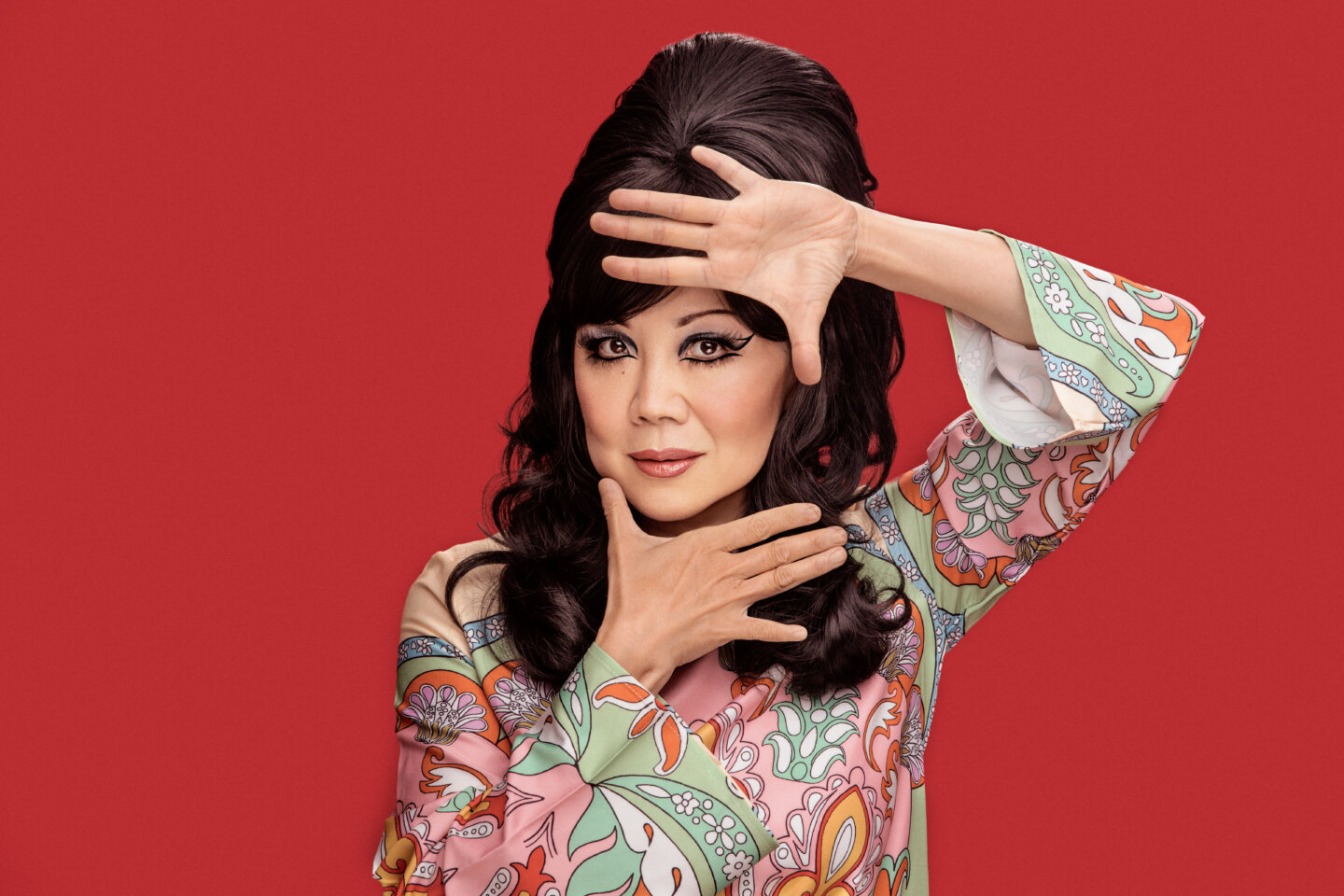
You’re invited to a rare night of music with comedian Margaret Cho. After an eight year hiatus from playing music, yes, you heard that correctly – playing music – this five-time Grammy nominee released her “Lucky Gift” album in February.
On Tuesday April 1, following an in-depth Q&A with music journalist Lyndsey Parker, Cho and her band will perform selected songs from “Lucky Gift.” The band will also be discussing the new album and her creative process – followed by the special performance. This event will be happening at The Grammy Museum.
We have partnered with The Grammy Museum to give away pairs of tickets to our lucky winners. Win your tickets by entering here!
The ticket giveaway will close Friday, March 28 at 4P.M. PT.
Check out our exclusive chat with Cho about her return to music, activism and Pop Diva saviors!
“I am thrilled to share this album which has been many years in the making. There’s tributes to Robin Williams, lost love, found love and anthems to non-binary and gender non-conforming folks. I collaborated with Garrison Starr and Roger Rocha in different cities at different times but it all feels like it comes from the same place and the same heart.”
MArgaret Cho, about her new music
Arts & Entertainment
Billboard’s Women in Music ticket giveaway announcement
Enter to win, visit our Instagram page and like, comment and share the post

Billboard will be hosting the Women in Music event this Saturday, March 29 at the Youtube Theatre, featuring Doechii as the Woman of the Year and Laverne Cox as host.
Becky G will be among the award presenters during this event, alongside many other exciting performers and presenters.
Los Angeles Blade partnered with Billboard to announce a ticket giveaway for a lucky winner to win a pair (2) tickets to the event.
To enter to win, visit our Instagram page and like, comment and share the post about the ticket giveaway. Make sure to tell us in the comments why you deserve to win and who you look forward to seeing live!
The ticket giveaway will close tomorrow, Tuesday, March 25 at 4P.M. PT.
For more information on the event, visit the Women in Music page.
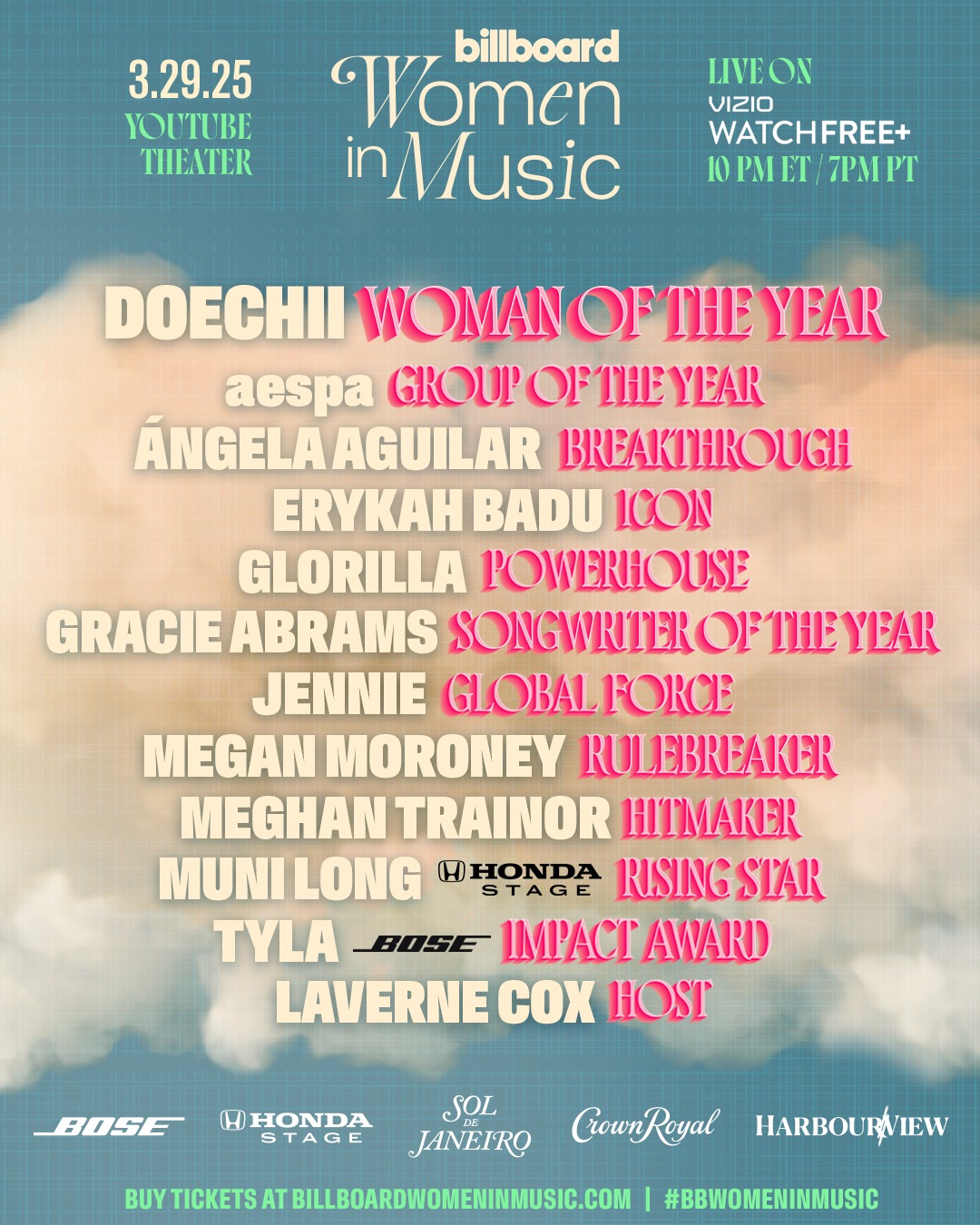
a&e features
Over a dozen renowned queer poets, authors to come together for literary event
Precinct DTLA will host free event celebrating poetry

During a time when members of politics seem hell-bent on keeping queer voices silenced, Los Angles continues to be home to a thriving, queer community of poets. On March 28th at 5 pm, 19 renowned LGBTQ+ poets and authors from across the country will be tongue tied at Precinct in Downtown Los Angeles for a free poetry event titled ‘Tongue Tied.’
This group of writers will be reading their queerest work while shibari bondage artist Jupiter will create rope ties on the poets while they perform. The night asks: what does it mean to create under restraint?
The mastermind behind Poetry Unbound is Brian Sonia-Wallace, a leading figure in the literary world with published work and who also served as the 4th Poet Laureate of West Hollywood. He is also a performance artist who has written poetry for strangers in the most unconventional of ways. We talked with Sonia-Wallace about his career, the literary community in L.A and what to expect from the event.
What was your first exposure to poetry, and what attracted you to get into that literary genre?
I was a fantasy nerd growing up and loved the songs and spells in Tolkien, CS Lewis, Ursula Le Guin, and Susan Cooper. The idea that you could invent a world with words — and new languages to inhabit that world — blew my little gay mind. Wizards always need a magic word.
This has, I think, affected my view of poetry in the world. I have, well, an academic interest in poetry’s history and structure, but I’m more curious about how pure language can short-circuit our ability to feel. People use poetry — at weddings, at funerals, on anniversaries. I think the goal of all artists is to say the ‘unsayable’ and in that little piece of magic make it suddenly sayable by anyone. Poetry feels to me like the most pure way to do this.
How does your queerness add to your poetry?
I think queer people are natural poets — we’re masters of the ‘unsayable.’ We’ve all had long conversations with ourselves before deciding whether or not to let anyone in.
As a type of performance art meets poetry, you have literally written poetry for strangers on the street. What is your mission with this type of writing?
Capitalism, baby! Honestly, this is how I accidentally started my business (we do lots of everything from weddings to corporate events to museums now with poets at typewriters).
But getting a little deeper, let me share this passage from my book:
“It seems to me that most people just need their stories to be heard. And that need is the right word. That we lose something when our stories are not heard. That something not only in us, but in the world, dies.
With every poem I write, I remember that the value of a story doesn’t depend on how many likes or retweets it gets, or how many people it reaches.
Sometimes, just one person hearing a story — is enough.”
-The Poetry of Strangers
Does any particular stranger you wrote for stick out in your memory?
So we did an event this week for Sketchers (thanks for the shoes, Sketchers!) where I got to write for various shoe executives from around the country. Almost all the women wanted poems about their kids, toddlers or young adults, on whom these mothers had spent so many thankless hours. About half of them cried, hearing their stories reflected back – having them witnessed. How often is that love and labor seen and acknowledged?
Likewise, one young man spent 15 minutes just pouring out his gratitude for his mom. She was his biggest cheerleader growing up, and when he packed up to move for this job a quilt she made him was the first thing he packed and unpacked. Who else can a man gush to about his mom?
Finally, an older man, from the South, white-haired, almost-military-bearing. Traditional, you understand. Who knows how he voted? I didn’t ask. He wanted a poem for his mom. The first thing he told me was that she was an alcoholic, but had been sober 30+ years, ever since his daughter was born and he’d given her an ultimatum: booze or the grandkid. The grandkid won. And now grandma was dying of cancer, he felt guilty his wife was taking care of her back home. His mom could always laugh at herself, he told me. He remembered when he was six her running down the sidelines with him all the way to a touchdown in a peewee football game.
After I read him his poem, he hugged me so hard the event photographer practically jumped on top of us and started snapping photos, eager to capture the emotion.
It’s become cliche to talk about the crisis of masculinity in the US. What these experiences show me is that there’s a vulnerability and even an eagerness to engage with it, but we’re not always helping people find the tools. Therapy is one. But so’s poetry. So’s bowling. You know. Being with people. Seeing and being seen.
You also served as the fourth West Hollywood City Poet Laureate for a number of years. What was your biggest accomplishment or best memory from serving in that position?
The Laureateship taught me so much and really helped me feel like I could and should speak about and with our community. I think I’m most proud of helping re-start the APLA Health Writers’ Group for older adults living with HIV, which has existed since 1989 but was defunct until we relaunched it on Zoom during the COVID lockdowns. That, or the poetry walk on Santa Monica Blvd on the median strip west of The Abbey, check it out!
One of my goals is always to bring poetry to unlikely places, and where better to start in WeHo than the gay bars on the Santa Monica Blvd strip? We started an open mic at Micky’s and now are at The Wild (check out our UnBound series, March 19 is the next one!) — it’s been a joy running an event that focuses on people’s voices and stories in places that are often purely physical, and creating a platform for hundreds of artists in our community.
Tongue Tied — what is the correlation between poetry and shibari?
When Jupiter first tied me up I knew I had to get him for a poetry show. The work he does with shibari, the exploration of discomfort and trust, felt weirdly similar to what I do, emotionally, at the typewriter. It’s about a moment of intentionality and slowing down that has the potential to be transformational.
That said, I’m also a theater person and get bored at poetry readings. I need visuals! Cue: watching poets get tied up. I love the juxtaposition, the reminder that these minds are also bodies, and the challenge to the poets to not just come do their usual schtick but to have a genuine, first-time moment with their work and with all of us.
You have quite an impressive group of poets for this event, how did you gather them all together?
Gosh, some great people said yes, didn’t they? These queens have Pulitzers and professorships. I’ve attended the AWP Conference for three years now, and built relationships through that time — but I’ve also just been a fan and asked! There’s nothing like when your idol says they’ll do your show.
What do you want the audience to walk away with the most from experiencing Tongue Tied?
I hope they leave tongue-tied! Ok, ok, I couldn’t resist. I hope folks will go away having seen something they’ve never seen before and will never see again, that they find their new favorite artist, befriend their idol, and, if they’ve never written a poem before, promptly go and do so.
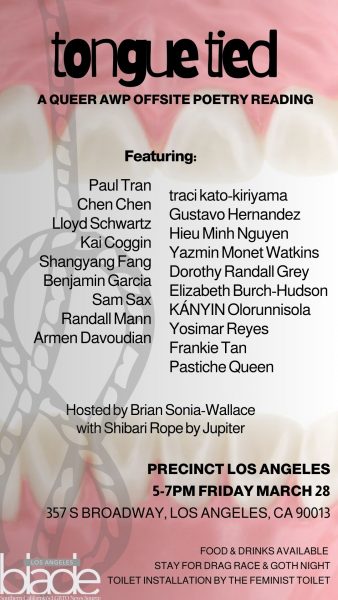
Tell us about the thriving queer poetry community in Los Angeles.
LA is one of those cities where I’m constantly finding out about new events and pockets I’d never heard of. The Nonfiction Show at Nico’s Wines in Glendale? So cool! Empty Trash (formerly at The Ruby Fruit)? How do they get these writers?! Act 3 Open Mic in DTLA (@act3openmic)? So many queer rappers practicing their craft.
And that’s not counting the bookstores. I don’t know if you’ve been following the news, but reading is gay now. Always has been.
What are the biggest challenges facing a queer poet in today’s social and political climate?
It’s a sign of my middling success in the literary world that none of my books has been banned yet, and I’ve been known to talk about trans witches and pups getting fisted, so go figure. But we know about book banning.
I think the thing we’ll be seeing coming up is a shift in our language. Queer folks have always developed their own language to pass undetected (think Polari) and now as we’re seeing the widespread destruction of funding and even mention of anything BTQ+ and even LG, I’m thinking with some smart people about how to shore up support at the local level and lie convincingly, in a way that lets only friend in, at the national level.
It’s bleak, but we’ve always found each other. Always will.
What else can we look forward to from your group this year?
Pride Poets will be at the WeHo/LGBT Center’s Pride Arts Festival, and partnering with Beverly Hills to help with their 4th ever Pride celebration — and look out for some poetics at World Pride in DC as well! I have a commission out there premiering that week at a certain highly reputable institution with a new cheeto-haired chairman, if I don’t blow it by being too gay first.
What is your message to the queer community?
Be gay, do crime.
Always gotta lead with that. But really: find your people, trust your people are out there, and don’t be afraid of anyone, especially yourself.
Event Details:
Location: Precinct, 357 S Broadway, Los Angeles, CA 90013
Date & Time: Friday March 28, 5-7 pm
Free Admission
The featured poets include Pulitzer Prize winners, Poets Laureate, professors, activists, and published authors: Paul Tran, Chen Chen, Lloyd Schwartz, Kai Coggin, Shangyang Fang, Benjamin Garcia, Sam Sax, Randall Mann, Armen Davoudian, Gustavo Hernandez, Hieu Minh Nguyen, Yazmin Monet Watkins, Dorothy Randall Grey, Elizabeth Burch-Hudson, KÁNYIN Olorunnisola, Yosimar Reyes, Frankie Tan, and Pastiche Queen.
Movies
Stellar cast makes for campy fun in ‘The Parenting’
New horror comedy a clever, saucy piece of entertainment

If you’ve ever headed off for a dream getaway that turned out to be an AirBnB nightmare instead, you might be in the target audience for “The Parenting” – and if you also happen to be in a queer relationship and have had the experience of “meeting the parents,” then it was essentially made just for you.
Now streaming on Max, where it premiered on March 13, and helmed by veteran TV (“Looking,” “Minx”) and film (“The Skeleton Twins,” “Alex Strangelove”) director Craig Johnson from a screenplay by former “SNL” writer Kurt Sublette, it’s a very gay horror comedy in which a young couple goes through both of those excruciatingly relatable experiences at once. And for those who might be a bit squeamish about the horror elements, we can assure you without spoilers that the emphasis is definitely on the comedy side of this equation.
Set in upstate New York, it centers on a young gay couple – Josh (Brandon Flynn) and Rohan (Nik Dodani) – who are happily and obviously in love, and they are proud doggie daddies to prove it. In fact, they are so much in love that Rohan has booked a countryside house specifically to propose marriage, with the pretext of assembling both sets of their parents so that each of them can meet the other’s family for the very first time. They arrive at their rustic rental just in time for an encounter with their quirky-but-amusing host (Parker Posey), whose hints that the house may have a troubling history leave them snickering.
When their respective families arrive, things go predictably awry. Rohan’s adopted parents (Edie Falco, Brian Cox) are successful, sophisticated, and aloof; Josh’s folks (Lisa Kudrow, Dean Norris) are down-to-earth, unpretentious, and gregarious; to make things even more awkward, the couple’s BFF gal pal Sara (Vivian Bang) shows up uninvited, worried that Rohan’s secret engagement plan will go spectacularly wrong under the unpredictable circumstances. Those hiccups, and worse, begin to fray Josh and Rohan’s relationship at the edges, revealing previously unseen sides of each other that make them doubt their fitness as a couple – but they’re nothing compared to what happens when they discover that they’re also sharing the house with a 400-year-old paranormal entity, who has big plans of its own for the weekend after being trapped there alone for decades. To survive – and to save their marriage before it even happens – they must unite with each other and the rest of their feuding guests to defeat it, before it uses them to escape and wreak its evil will upon the world.
Drawing from a long tradition of “haunted house” tropes, “The Parenting” takes to heart its heritage in this campiest-of-all horror settings, from the gathering of antagonistic strangers that come together to confront its occult secrets to the macabre absurdity of its humor, much of which is achieved by juxtaposing the arcane with the banal as it filters its supernatural clichés through the familiar trappings of everyday modern life; secret spells can be found in WiFi passwords instead of ancient scrolls, the noisy disturbances of a poltergeist can be mistaken for unusually loud sex in the next room, and the shocking obscenities spewed from the mouth of a malevolent spectre can seem as mundane as the homophobic chatter of your Boomer uncle at the last family gathering.
At the same time, it’s a movie that treats its “hook” – the unpredictable clash of personalities that threatens to mar any first-time meeting with the family or friends of a new partner, so common an experience as to warrant a separate sub-genre of movies in itself – as something more than just an excuse to bring this particular group of characters together. The interpersonal politics and still-developing dynamics between each of the three couples centered by the plot are arguably more significant to the film’s purpose than the goofy details of its backstory, and it is only by navigating those treacherous waters that either of their objectives (combining families and conquering evil) can be met; even Sara, who represents the chosen family already shared by the movie’s two would-be grooms, has her place in the negotiations, underlining the perhaps-already-obvious parallels that can be drawn from a story about bridging our differences and rising above our egos to work together for the good of all.
Of course, most horror movies (including the comedic ones) operate with a similar reliance on subtext, serving to give them at least the suggestion of allegorical intent around some real-world issue or experience – but one of the key takeaways from “The Parenting” is how much more satisfyingly such narrative formulas can play when the movie in question assembles a cast of Grade-A actors to bring them to life, and this one – which brings together veteran scene-stealers Falco, Kudrow, Cox, Norris, and resurgent “it” girl Posey, adding another kooky characterization to a resume full of them – plays that as its winning card. They’re helped by Sublett’s just-intelligent-enough script, of course, which benefits from a refusal to take itself too seriously and delivers plenty of juicy opportunities for each of its actors to strut their stuff, including the hilarious Bang; but it’s their high-octane skills that bring it to life with just the right mix of farcical caricature and redeeming humanity. Heading the pack as the movie’s main couple, the exceptional talent and chemistry of Dodani and Flynn help them hold their own among the seasoned ensemble, and make it easy for us to be invested enough in their couplehood to root for them all the way through.
As for the horror, though Johnson’s movie plays mostly for laughs, it does give its otherworldly baddie a certain degree of dignity, even though his menace is mostly cartoonish. Indeed, at times the film is almost reminiscent of an edgier version of “Scooby-Doo”, which is part of its goofy charm, but its scarier moments have enough bite to leave reasonable doubt about the possibility of a happy ending. Even so, “The Parenting” likes its shocks to be ridiculous – it’s closer to “Beetlejuice” than to “The Shining” in tone – and anyone looking for a truly terrifying horror film won’t find it here.
What they will find is a brisk, clever, saucy, and yes, campy piece of entertainment that will keep you smiling almost all the way through its hour-and-a-half runtime, with the much-appreciated bonus of an endearing queer romance – and a refreshingly atypical one, at that – at its heart. And if watching it in our current political climate evokes yet another allegory in the mix, about the resurgence of an ancient hate during a gay couple’s bid for acceptance from their families, well maybe that’s where the horror comes in.
Events
City of WeHo to host Rainbow Key Awards
Celebration will honor those who have made outstanding contributions to the LGBTQ+ community
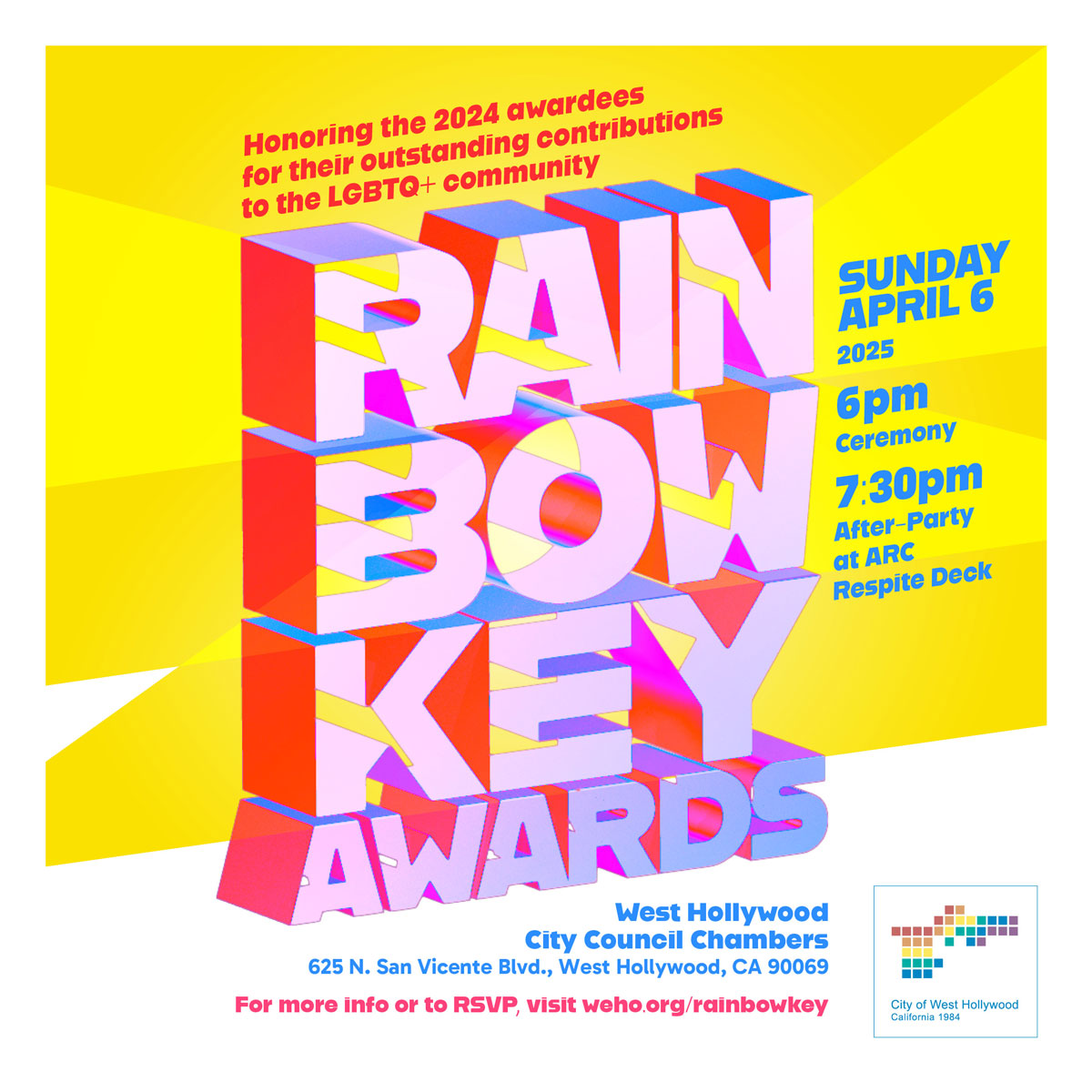
The City of West Hollywood and its LGBTQ+ Commission will host the annual Rainbow Key Awards to recognize nominees who have made outstanding contributions to the LGBTQ+ community.
This year’s Rainbow Key Awards Ceremony will be free and held in-person on Sunday, April 6, at 6PM at the city’s Council Chambers and Public Meeting Room, located at 625 N. San Vicente Boulevard.
This year’s awards will honor the awardees who were selected by the LGBTQ+ Commission listed below.
- Dapper Dyke Vivian Escalante is a leader in lesbian activism who established Dykes on Bikes in West Hollywood and Long Beach. In a time of limited representation, her work toward the visibility and empowerment of the lesbian community stood out above others.
- Rebecca Gitlin Ph.D served as the first LGBTQ+ Services Specialist at the LA County Department of Mental Health’s Anti-Racism, Inclusion, Solidarity and Empowerment Division. She now serves as a clinical supervisor at the LACDMH Hollywood Mental Health Cooperative. Gitlin has been instrumental in ensuring that both identity and gender-affirming are included in all of the services provided by LACDMH.
- LZ Love is a legendary African American transfeminine singer who has entertained for decades with her blues, gospel, and dance music. She started her career at age 16 and served as a background vocalist for the great disco diva Sylvester. She has performed at Pride events across the nation and has performed at the City of West Hollywood’s annual Transgender Day of Remembrance.
- Brian Sonia-Wallace founded Pride Poets, the band of LGBTQ+ typewriter poets who have collectively written thousands of free custom poems at West Hollywood Pride events and beyond since 2019, giving the community a chance to have their stories of love, loss, and celebration honored through poetry. He served as West Hollywood’s 4th Poet Laureate from 2020-2023, creating space for hundreds of LGBTQ+ writers to express themselves and build community through the APLA Writers’ Workshop, The Mic @ Micky’s, and the West Hollywood Slam Team.
- Jackie Beat is a drag superstar who has been entertaining audiences across the U.S. and Europe for over three decades. Beat is known for her razor-sharp comedy and hysterical song parodies. Apart from her live tours, Beat has also worked in the film and television industry and has often used her talents to raise money for HIV and AIDS charities and other organizations supporting the LGBTQ+ community.The awards ceremony will be immediately followed by a reception and afterparty on the Respite Deck at the West Hollywood Park Aquatic and Recreation Center, adjacent to West Hollywood Library.
Additional information for this free event, including registration details, is available at the city’s website or by RSVP at Eventbrite. For those unable to attend, the event will also be live-streamed and recorded on the city’s WeHoTV channel on YouTube.
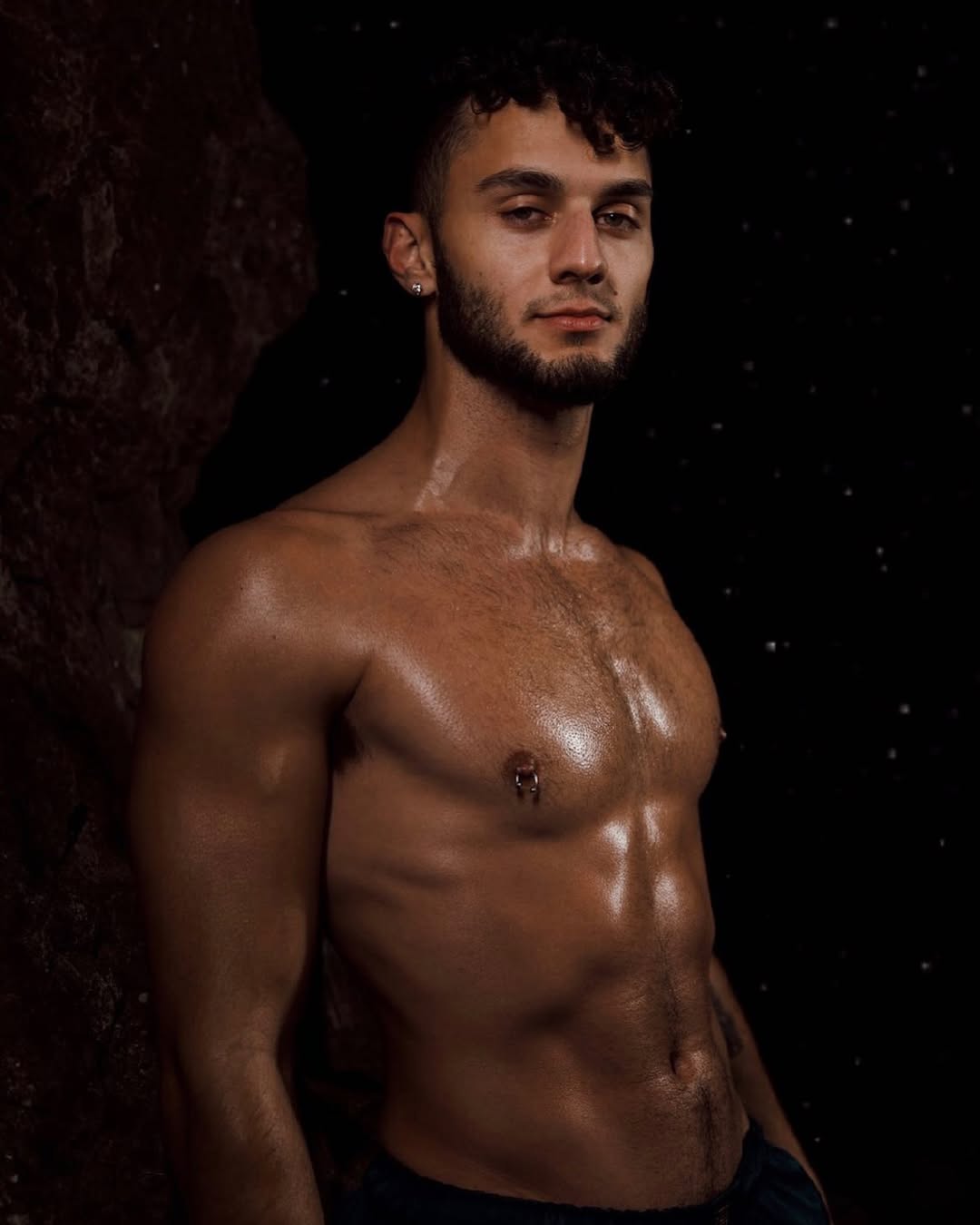
As part of Los Angeles Blade’s mission to get to know our community, we continue to do a deep dive into personalities who represent the queer culture of entertainment, nightlife, activism and politics.
In this “Meet Your Local” column, we celebrate club culture.
For those of us who frequent the queer nightlife, we have come to know dancer Jake Mathews, SoCal’s go-to go-go boy. Jake’s dance card is full as you can find him at any of the popular nightclubs throughout the week, sometimes dancing in multiple locations in one day.
He’s keeping busy, raising money to continue his education. He has been instrumental in adding some positive energy to the nightlife space and his personality makes any patron feel welcomed and comfortable. His trademark dance moves reflect his extensive training in dancing with the pole, it is an art form unto itself.
We sat down with Jake in between his dance sets to get to know the person beyond the persona.
Hometown: Morgan City, Louisiana
How did you get into go-go dancing?
I got into go-go dancing at 19 on the reboot of the show Queer as Folk. Since then, I haven’t turned back and have danced in numerous cities and bars!
What do you love most about dancing in the queer LA nightlife?
I love the community that I’ve found. When people make an effort to come support me it means a lot.
What do you love most about life in LA?
The resources that are available for our community.
What are some of the misconceptions people have about a go-go dancer in LA?
They often sexualize us and believe they have easy access to us. Some of us live a completely different life outside of dancing and put on a persona while on stage.
You are also a pole artist. How does that differ from your go-go dancing?
Pole dancing feels more like an art, rather than entertaining a crowd on energy.
How does being queer add to your dance artistry?
I like to freely express myself while dancing and am not limited to any societal standards.
How do you balance your personal life with the nightlife?
I don’t get much sleep. Go-Go dancing allows me to live my daytime life, which consists of being busy. I’m starting my master’s program this summer thanks to Go-Go dancing!
What is your biggest pet peeve while go-go dancing?
I don’t like when people touch my private areas. As I previously said, the audience does not have that access or permission to do so.
What are some of your favorite venues to dance at and why?
I love dancing at the Abbey because of the co-workers! It feels like I’m part of something greater than me – especially with Chappell’s “Pink Pony Club.”
What do you want most out of your career?
I want to inspire others to give it a try.
Any advice to give a new Go-Go dancer?
Don’t worry too much about those negative thoughts in your head. In other words, if you’re thinking about how the crowd is perceiving you, find a way to redirect that thinking. People love you for you! You shouldn’t be like everyone else.
Favorite hobbies when you aren’t dancing:
I like to read & write, travel and listen to live music.
Is dating hard while being such a big part of the nightlife?
No. Nightlife is just another job! A partner should be able to accept the work one enjoys. Scheduling together time may be difficult, but this is common with many careers.
What is your signature dance move?
It used to be shoulder stands until I damaged my ear. I usually just freestyle and hope for the best!
Favorite song to dance to:
I like to dance to EDM because I feel so free!!
And your message to the queer community?
We need everyone in our community to come together and support each other in the daytime and the nighttime. This means coming out to nightlife, supporting queer artists, volunteering for our community, and acting as a safe space for each other.
Follow Jake on IG: @jakemtws
-
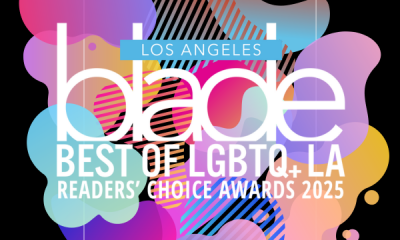
 Arts & Entertainment2 days ago
Arts & Entertainment2 days ago2025 Best of LGBTQ LA Readers’ Choice Award Nominations
-

 Local2 days ago
Local2 days ago‘Think of those who have not been seen,’ Cynthia Erivo’s powerful message at GLAAD Awards
-

 Features2 days ago
Features2 days agoTristan Schukraft speaks on keeping queer spaces thriving
-

 Opinions2 days ago
Opinions2 days agoGay bar in California bans MAGA gear — but no other political expression — from its premises
-
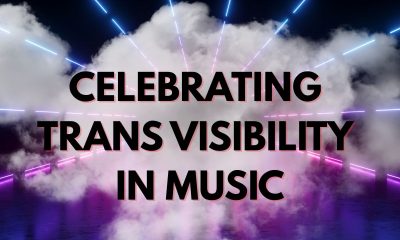
 Arts & Entertainment2 days ago
Arts & Entertainment2 days agoTrans Day of Visibility: Let us put you on 5 Latinx musicians you should be listening to right now
-

 California1 day ago
California1 day agoGLAAD’s Latine Honors celebrates culture and identity with packed house
-

 California6 hours ago
California6 hours agoTwo anti-trans bills fail to advance in California
-

 Movies5 hours ago
Movies5 hours agoSexy small town secrets surface in twisty French ‘Misericordia’

